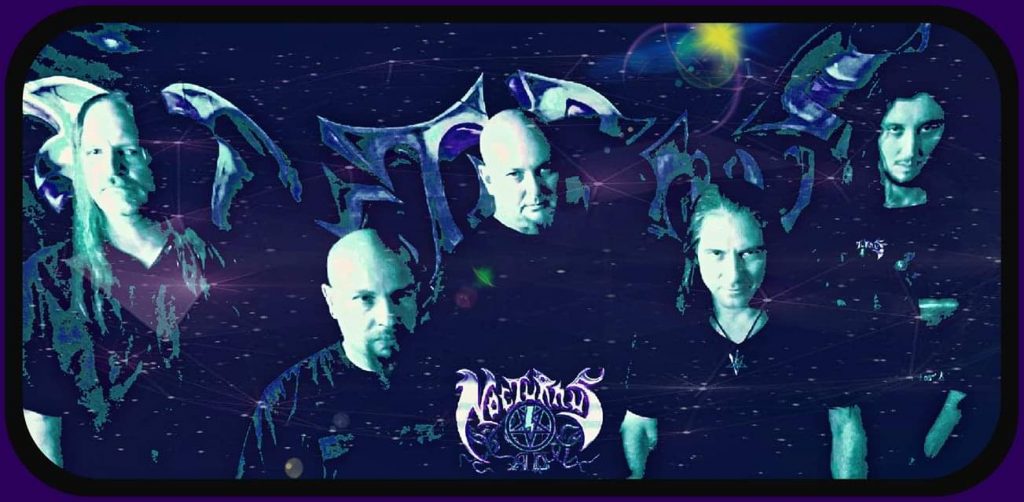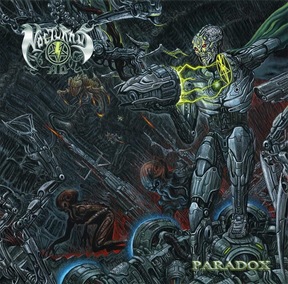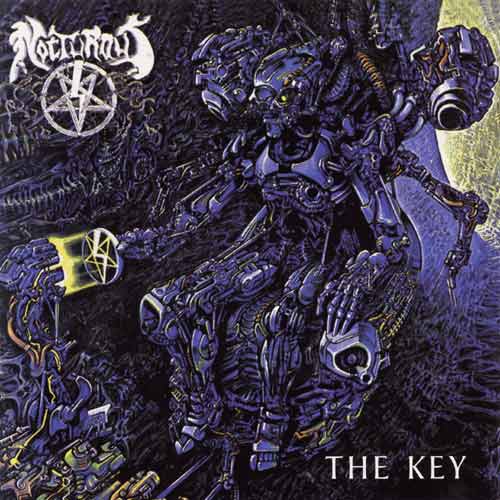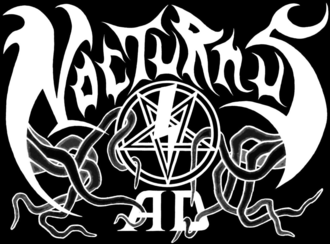THE QUEST OF DR. MAGUS
Interview with Mike Browning of NOCTURNUS A.D.
By: Dr. Abner Mality
In the hallowed year of 1990, nothing was shaking up the metal scene more than death metal. Every place you looked, bands were becoming faster, more distorted, more evil and more transgressive. But who shook up the shakers? Enter NOCTURNUS…

The Key was a forward thinking paradigm shift in the death metal world. If you wanted to do something to cross a line, then just add keyboards to death metal. That was considered the ultimate no-no back then. But The Key managed to integrate eerie and futuristic synthesizer sounds into the roaring extremity of full force DM. And speaking of futuristic, this was a band that drew inspiration from Asimov, Herbert and Clarke as much as Satan, Lucifer and Beelzebub. In fact, NOCTURNUS found a way for cyborgs and demons to shake hands and fraternize. Something else hitherto unheard of…
That was in 1990 and the story of Dr. Allen William Magus began on The Key. It took 29 years for the story to continue with a brilliant new album from the band, now called NOCTURNUS A.D. for legal reasons. Paradox is just as much a breath of fresh air in 2019 as The Key was in 1990. It’s an amazingly smooth sequel that continues the Magus story brilliantly.
Now,as then, drummer/vocalist MIKE BROWNING is the mastermind behind NOCTURNUS A.D. and its mind-expanding concepts. So it’s a perfect time for Dr. Mality to step into the Chronotronic Actualizer and step into the future to get a few words from Mr. Browning…
REBEL EXTRAVAGANZA: Paradox is one of the most amazing sequels to a previous concept album that I’ve heard. It sounds like it could have come out just a couple of years after The Key and not 30 years. Has the actual story been in your head all these years or is it something very recent?
MIKE BROWNING: Actually, it’s a little bit of both. Back when we recorded The Key, I was singing and writing 80-90% of the lyrics. Davis was helping me and he’d come up with some song titles here and there and some lines to throw in the song, but I’d always put the whole thing together. I was fully intent on continuing the ‘Key’ story on the second NOCTURNUS record but then the label wanted us to have a frontman and we wound up getting a singer. That ended up not working out so well. So back then I never really got the opportunity to continue with The Key story. The last song on The Key, ‘Empire of the Sands’, gradually fades out on purpose because we were going to fade back in with the same riff on the second album and continue the story. But, of course, that never happened.
Finally, I came to the point where I knew I really wanted to do this again. I had ideas about continuing the story and ideas about where I wanted to go even back then. But over the years, that’s changed a little bit, but lately I’ve had some really strong ideas of what I wanted to do with the story and the character and everything. I didn’t want to do it with my other band AFTER DEATH and I didn’t want to do it with NOCTURNUS again because the lawsuits might start coming back. A lot of people ask, why don’t you just call it NOCTURNUS again? What’s with the A.D.? If I did do that, I’d have to include the other records with that name. There was a NOCTURNUS album called Ethereal Tombs without me on it in 2000. If I was to use the name NOCTURNUS, those albums without me on them and why would I do that?
RX: Shakespeare wasn’t kidding when he said “kill all the lawyers”…
MB: [Laughs] Right, right! I want people to know that NOCTURNUS A.D. is a continuation of what I wanted NOCTURNUS to be. It’s like I resurrected the band under the conditions of what I wanted to do back then.
RX: It’s such a seamless experience listening to it. You wouldn’t know so much time had gone by between the albums. Now the main character in your story is Dr. Magus. Was there some character in literature or film that inspired this guy?
MB: When I was a kid in the ’70s, the big thing for me was going to the store and getting comic books. Back then there was no Internet, no cellphones. Back then you watched TV or you read, that was it. The TV didn’t have that much n back then but I did get to see shows like Star Trek, Space:1999 and I was especially big on the show UFO. Night Gallery and Kolchak, The Night Stalker…all that stuff was huge to me. When I started getting into music, I wanted to mix all of this together.
RX: Oh God, my favorite character of all time is Kolchak. That was the best combination of funny stuff and scary stuff ever. If that show had lasted another season, it would have been as big as Star Trek.
MB: I think it was destined to be a cult favorite. I don’t understand why it didn’t last longer.
RX: These days, sci-fi and fantasy is so huge, people forget that in those days, it was looked upon almost like low trash. Until Star Wars came along, it was usually buried.
MB: That’s true. Space:1999 didn’t last all that long, either. Getting back to Dr. Magus, he was inspired a lot by comic books. Fantastic Four was a really cool comic book. I really liked Dr. Doom quite a bit. I kind of used him and IRON MAIDEN’s Eddie to create a mascot for The Key. I don’t know if you’ve seen the original artwork that wasn’t used on The Key. There was a girl I was dating back then in the early ’80s and her brother actually did the cover for The Key. He did a painting. I still have the painting and it’s going to eventually be put on a shirt. It’s the exact same painting as The Key but done in a ’70s comic book cover type of look. If you look on my Facebook page, you’ll see it. It’s the same Key character but he’s a little bit more simple looking. You can definitely see how he’s changed over the years.
A lot of people think maybe Dan Seagrave came up with that character. He came up with the metal part, changing it a little bit from the original, but I had the original idea of having him in the chair and the band trapped in the tubes. That was all my idea and it was on the first cover before Seagrave even did it. When Dig from Earache Records saw that cover, he said this is just not detailed enough. He said it does look like a ’70s comic book cover but it’s too plain for an album. He took that picture and gave it to an artist to flesh out. I didn’t know who Seagrave was at the time. Dig said if you like Dan’s better, we’ll go with it. If you don’t, we’ll stick with the original. Well, we saw Dan Seagrave’s version and it blew the other one out of the water. So yeah, we’ll definitely use Dan’s.
RX: Do you think the whole concept might come full circle and that there might be a comic book or graphic novel with Dr. Magus?
MB: Yeah, it could even go farther than that, actually. Since we now have 3D computer animation and things like that, I’ve paid somebody to make The Key character in a 3D model. Now the cover of Paradox is an actual painting. I wanted to have a real painting for the cover, but I wanted Dr. Magus in 3D form so he could be used in computer games. He can be used in animation, he can be used in a movie, he can even be printed out like an action figure. I noticed when you have a mascot for a band, it creates a really good focal point for that band. Now I have something to tell the story with. The weird thing is, for all those years, I never gave the guy a name. He was just “the evil scientist”, “the guy who’s half robot, half human”. But if I’m going to resurrect this story, I’ve got to get a name for him.
I started thinking and all of a sudden, Dr. Magus popped into my mind. But he’s got to have a full name. I came up with Allen William Magus as his name. “Will” is short for William and “Al” is short for Allen. So you have three words…”Will”, which is used in an Aleister Crowley way. “Al” or AL means God. And Magus is a magician. So it’s kind of the Will of God in a magician.
RX: That leads into another question. There’s always been a link in NOCTURNUS’ lyrics between science and the occult. What’s your personal view or philosophy on that? Is the occult just a science that is not understood?
MB: Well, most of it is. Even if you go back to Aleister Crowley himself, he said magic is the science of conforming to will. It is a science and there are a lot of scientific aspects to the occult. You have to know quite a few things if you’re going to get involved with it. It’s a huge undertaking. You could read books on the occult for your whole life and still only touch the tip of it. There’s an author named Kenneth Grant that I like and he was actually Crowley’s last student. He was taking care of him at the end. He wrote a series of books that tied together a lot of left hand path occult stuff with Lovecraft and voodoo. He took all these different things and rolled them all together into one thing. And in the end, aliens came into the picture! These beings always seem to come into it…not just demons, but other beings that are separate. Not demonic, not angelic. There’s a third type of being out there.
RX: The author John Keel wrote about this subject a lot. He always thought that fairies, demons and aliens were all related and were a cover for some other kind of intelligence. I don’t think any one person has the answer to everything, but another person that was very involved with science and the occult was Jack Parsons, the rocket scientist.
MB: Oh yeah, I know who Jack Parsons is for sure. Have you seen the TV show Strange Angels?
RX: No, I haven’t seen that one yet.
MB: It’s really good! It’s not totally historically accurate but it’s close. It’s the Jack Parsons story, it’s all about him. It’s got the whole aeronautics angle and everything. CBS All Access put it out. Season One is done and they just announced Season Two is filming. Everything’s set in the ’40s and ’50s.

RX: Does Paradox represent the end of the story or will Dr. Magus’ story continue into further albums?
MB: Oh, the story will definitely continue. On The Key, the story was concentrated into four songs. A lot of people thought the whole Key album was one big concept but it really wasn’t. The first part of the album, songs like ‘Lake Of Fire’ , ‘Standing In Blood’, ‘Neolithic’, ‘Visions Beyond The Grave’…all those songs were written in the late ’80s. Those early NOCTURNUS songs were more just straight occult and horror. As we started putting more sci-fi and weird events into the songs, the story began to make itself clear. We finished the album with ‘Empire Of The Sands’ which put it all together. Then we faded out on ‘Empire…’ so we could start the second album with the same riff and continue the story. But that didn’t happen when we did Thresholds. Actually, if you listen to ‘Antechamber’, which is the first song on Paradox, the first riff is the ‘Empire…’ riff backwards.
RX: I really need to play The Key and Paradox back to back. I’m guessing that I will pick up on a lot of stuff I’d miss if I listened to them with a lot of separation.
MB: Well, ‘Lake Of Fire’, ‘Standing In Blood’ and ‘Seizing The Throne’, the first song on Paradox, go together. ‘Neolithic’ and ‘Paleolithic’ go together.
RX: The last song on the new album is an instrumental called ‘9’. Does that relate to the story and what was the inspiration for that song?
MB: It doesn’t really relate to the story. I don’t know why, but I really wanted to have 9 songs on the record. When we got close to recording time, we only had 8 songs ready. We had part of a song that we were working on but we didn’t have enough time to do lyrics for it. We took our last two practices before we went in to do the album and we just took those rhythms that we had and went with those. We couldn’t think of a title, so I just said, let’s call it number 9! It was the ninth song we wrote, too. In the early stages, all the songs on the album just had a number instead of a name…”Song #1”, “Song #5”, etc.
RX: Maybe I put more meaning into it than I should have!
MB: Even King Diamond had an album called 9, there are 9 Satanic statements. 9 is a very occult number. Since our song was an instrumental, it can’t have any lyrical connection in any way, but the title wound up being a kind of play on everything. There’s some irony in that title, too.

RX: Between The Key and Paradox, the music itself is a very smooth transition. For future NOCTURNUS albums, do you see that sound changing any? Maybe adding symphonic elements? Or are you satisfied overall with the sound you’ve achieved?
MB: It’s kind of hard to say what we might do and what we might not do, because sometimes things just progress in their own way. You can put something new into it without planning to. Paradox actually has something The Key doesn’t have and that’s keyboard solos. We never had that before in any of my bands. I’ve never had a keyboard player that could actually break out and do a guitar type solo. But the guy we’ve got now can do that with no problem. He just rips into these really cool solos that almost sound like they come from a guitar. So we will probably have a lot more of that in future efforts. Basically I see us building on the new stuff that we’ve done on Paradox.
RX: I think I could hear you doing a whole song that’s an eerie soundscape.
MB: We’re definitely going to start experimenting more. I always like to experiment with NOCTURNUS A.D. and pull something new out. Even the vocals are a little different on every song on Paradox. Some people didn’t like the way I sang on ‘Antechamber’ compared to ‘Procession’, I did see some comments that mentioned that. But it’s still me. All of it’s me. I wanted to make things a little different, I don’t want to sound the same on every song. I don’t like when bands do that. There’s a lot of bands out there, when one song stops and the next one starts, it sounds the same to me. I don’t want that. And I think on our albums, it doesn’t all sound alike.
RX: No, you avoid a lot of the monotone brutality you get in so many extreme metal bands.
MB: Well, death metal is like that. And it’s supposed to be like that! You kind of expect to hear certain things.
RX: I’m always amazed at albums where the band seems to play the same song 12 times in a row.
MB: Yeah, I never want to get stuck in that sort of situation. That’s also why not every song on the albums is part of The Key storyline. I wanted to keep that story going but definitely wanted the room to write about other things. Four songs is enough to make a change in the story but not have the whole album revolve around it.

RX: That’s kind of what RUSH did back in the ’70s. They had their ‘Cygnus X-1’ story go from album to album. I can even hear some RUSH influences in NOCTURNUS A.D.!
MB: Yeah, we have some of that, especially myself and our one guitar player who uses the synth guitar. He loves RUSH, too. He likes PINK FLOYD, RUSH, a lot of the weirder old stuff. Our other guitar player is strictly metal, a Kerry King kind of guy, y’know. It’s good because the two guitar players are completely different from each other and their solos sound different, too. On The Key, all that stuff was written by either Gino or Davis. With Paradox, I wanted to make really sure that both guitar players wrote riffs. When we got into the room, I’d say, Damien, play a riff. And we’d learn that riff. Then I’d say, Belial, play a riff. And we’d find a way to combine those riffs. Then I’d go back to Damien and have him do another riff. Not one person ever did a complete song. It was like a big puzzle that we all stuck pieces into. The guitars almost 50-50 on the writing this time. A lot of bands will have one main writer, but I thought, what would it be like if I took my two guitar players and made them go back and forth on coming up with riffs and rhythms? It’s kind of fun to do that.
RX: Have you got any touring plans for the new album?
MB: Well, the thing is, we all have jobs and I have a daughter so it’s hard to do any touring right now. We try to do as much as we can and pick out some really good shows that we can play. In June, we’ll be playing in Santiago, Chile for the Santiago Metalfest and that’s a pretty big event. We’ll also be playing the Destroying Texas fest two weeks later in June.
RX: The South American show will be crazy…
MB: Oh yeah! This is our third time down there. We going down there with NASTY SAVAGE, another Tampa band, so it’s going to be really crazy.
RX: Their ’80s is right now. What America had in the ’80s is what they are going through now.
MB: It gets better every time we go down there. The second time was better than the first and now this time, everything is going to be bigger and better. A better sound system, a bigger stage, more crazy stuff we can use.
RX: Three weeks ago, they had NYDM Spring Bash up in Milwaukee and that would be a perfect fest for you guys, but unfortunately this year was the last one.
MB: Yeah, things have changed. Even Maryland Deathfest is all inside now. We played there about five years ago and that was when they still had the two outside stages in the parking lot. That was just amazing!
RX: I’ve been able to cross a lot of bands off my bucket list at these fests. At the Bash this year I got to see HIRAX for the first time…
MB: Oh, Katon!
RX: Really cool dude, he’s done a lot for the underground metal scene…
MB: Yeah, we played with them a couple of years ago at the LA Strikefest. Really cool guy…we played that fest with NASTY SAVAGE as well. They played Friday and we did Saturday night.
RX: You guys ever had a SPINAL TAP moment on stage?
MB: We were playing in Australia one time and the amp just blew completely. Not a sound came out of our guitarist’s amp. That was a big show for us and what an embarrassment! But it happens, it happens.
RX: Any last words?
MB: If you were a fan of The Key from all those years ago, you have to pick up Paradox, it’s a total continuation of what we were doing then. If you’ve never heard NOCTURNUS A.D. before, check it out because it’s something different in death metal!
NOCTURNUS A.D. Online:
Facebook
Spotify